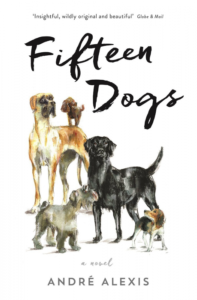“Artists make language vague so that someone can enter into it,” said André Alexis, winner of the 2015 Giller prize for his novel Fifteen Dogs. Alexis spent most of his life in Toronto but was born in Trinidad. Like many immigrant children, he was always conscious of being different, especially when it came to language.
“When I first came here, I spoke with a different accent. And so my sense of what words were was different,” he once said. This self-consciousness about language led to a career as a writer, and it found full expression in Fifteen Dogs.
The story begins with two gods debating the merits of human intelligence and its most recognizable product: language. Describing it as a “difficult gift” and an “occasionally useful plague,” the gods wager on whether or not bestowing human intelligence on dogs would cause them more unhappiness than joy. 15 dogs receive the gift.
But language, as the gods predicted, is a mixed blessing. While some dogs thrive on their abilities (one dog, Prince, even becomes a dog poet), others see language as “un-canine” and a threat to their identity. The pack fractures and much bloodshed ensues.
In the end, language—which carries in it the seeds of discord and poetry, self-consciousness, and the ability to give voice to our rapture—is what will save us from the emptiness that awaits each of us.
As he lies dying, Prince takes consolation in the beauty of language and the marvel of his having experienced it.
“It occurred to Prince that he had been given a great gift,” Alexis wrote in Fifteen Dogs. “Moreover: it was a gift that could not be destroyed. Somewhere, within some other being, his beautiful language existed as a possibility, perhaps as a seed. It would flower again.”
André Alexis must-read:
Fifteen Dogs
(Lansdowne Library code: PS 8551 L474 F53)

